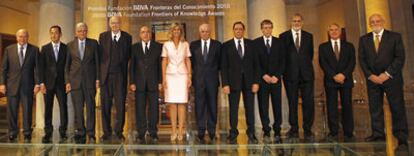Promoting passion for science
Nicholas Stern and Edward O. Wilson among BBVA Frontiers of Knowledge winners
Indispensable visionaries, key to understanding the evolution of the world we live in; these were just some of the compliments paid to the eight winners of this year's Frontiers of Knowledge prizes, awarded by the BBVA Foundation last week.
Francisco González, president of the BBVA bank and its foundation, said that the prizes - which have been handing out ¤3.2 million in eight categories since 2008 - seek to "celebrate passion for knowledge and innovation" and that they "reflect the map of knowledge of the early 21st century."
Of this year's eight winners - none of whom were Spanish - the best known in scientific circles was Edward O. Wilson, an 81-year-old US biologist and writer who has won two Pulitzer Prizes for his books, including On Human Nature. Wilson was honored in Madrid for developing the concept of biodiversity.
"We are beginning to understand that in order to save the living world it will be necessary to discover and analyze the species that comprise it, many of which are still unknown to science," he said in his acceptance speech.
A British economist who became a household name in 2006 for conducting the first extensive study on the cost of climate change, Nicholas Stern, said he wanted to stress "not just the great risks of inaction [in the face of global warming] but also the enormous opportunities represented by the transition to a low-emission economy."
The US computer scientist Donald E. Knuth, who contributed significantly to the language of computers, highlighted that "the best theories are inspired by problems that emerge from practice. The best practice feeds on theoretical results [...]. So we get a marvelous positive feedback loop, in which theory is based on practice and practice is improved by theory."
Japan's Shinya Yamanaka, recognized for his research with induced pluripotent stem cells (iPS), issued a warning: "This technology is still in its infancy. There are a multitude of challenges that must be overcome before it can be successfully applied to the discovery of new drugs and regenerative medicine."
The only artist to receive a prize, Germany's Helmut Lachenmann, offered his vision of contemporary music: "Music as a transgression of horizons, always reflected in a new way, as an evasion from the representations of beauty and order constrained by frameworks set by society."
The other winners were economist Lars Peter Hansen, chemist Gabor Somorjay, and the International Rice Research Institute, represented by its director Robert Zeigler. The award ceremony was presided by Science Minister Cristina Garmendia.

Tu suscripción se está usando en otro dispositivo
¿Quieres añadir otro usuario a tu suscripción?
Si continúas leyendo en este dispositivo, no se podrá leer en el otro.
FlechaTu suscripción se está usando en otro dispositivo y solo puedes acceder a EL PAÍS desde un dispositivo a la vez.
Si quieres compartir tu cuenta, cambia tu suscripción a la modalidad Premium, así podrás añadir otro usuario. Cada uno accederá con su propia cuenta de email, lo que os permitirá personalizar vuestra experiencia en EL PAÍS.
¿Tienes una suscripción de empresa? Accede aquí para contratar más cuentas.
En el caso de no saber quién está usando tu cuenta, te recomendamos cambiar tu contraseña aquí.
Si decides continuar compartiendo tu cuenta, este mensaje se mostrará en tu dispositivo y en el de la otra persona que está usando tu cuenta de forma indefinida, afectando a tu experiencia de lectura. Puedes consultar aquí los términos y condiciones de la suscripción digital.








































